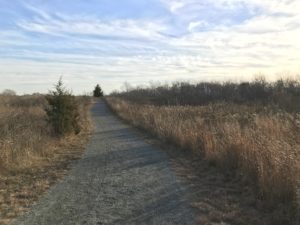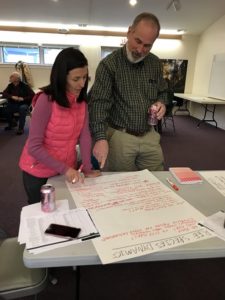New England Forest Climate Adaptation Listening Sessions
Natural resource professionals need scientifically credible, relevant, and timely information on climate change, its effects on ecosystems, and potential management options in order to effectively respond to climate change. In response, the Northern Institute of Applied Climate Science (NIACS) and Forest Stewards Guild have teamed up to conduct a needs assessment for New England and New York. These partners are seeking input on key areas of uncertainty where managers have questions so that we can help promote science to address managers’ needs.
The partners held a series of forest adaptation listening sessions; November 16 in Northampton, Massachusetts; December 6 in Orono, Maine; December 14 as part of the Forest Ecosystem Monitoring Cooperative conference in Burlington, Vermont; and December 19 in Smithfield, Rhode Island. Forest managers and scientists have also been providing input through an online questionnaire. Plans are progressing for more listening sessions in New York State in early 2019.

 This article offers an interim update on what NIACS and the Guild have been learning.
This article offers an interim update on what NIACS and the Guild have been learning.
First, the participants’ passion for the topic of forest climate adaptation is striking. Foresters, forest scientists, wildlife biologists, and conservation professionals turned out in force to share their experiences and questions about adapting forests to the changing climate. Participants freely engaged, exchanging ideas and discussing shared challenges and potential solutions.
Participants in the listening sessions and online questionnaire identified common areas of concern in forest climate adaptation. These include invasive species, tree species vulnerability, watershed or hydrologic impacts, wildlife, and human community impacts including social and economic implications. Participants also expressed concern about plant community dynamics. These focal topics were distilled down from participants’ input, and participants had the opportunity to spend time on the topics of greatest importance to them.

Significantly, participants expressed a need for human behavior to change to help forests adapt to the changing climate. Barriers of short-term thinking, lack of knowledge, shortage of economic incentives, and the scale of institutional infrastructure must be overcome. Human communities, including foresters, loggers, landowners, and legislators, must be inspired and empowered to act.
The meeting facilitators were struck by the fact that in sessions designed around identifying scientific needs, we heard a need to focus on human decision-making in order to move the needle on adapting forests to the changing climate. Forest scientists and managers conveyed that they would welcome better science to inform practice but more urgently feel the need to create and utilize tools that will change the way we as a profession and society approach forest climate adaptation.
What next? NIACS and the Guild are planning listening sessions in New York State, and will collate this information with that from the New England listening sessions. From all the information gathered, we plan to synthesize what we heard into a white paper and share it with all of you. Additionally, we plan to synthesize the ideas on actions we can take to move the needle toward adapting our forests to the changing climate. We also hope to begin connecting the dots toward bringing these ideas to life as projects with, or by, partners.
If you have additional thoughts on information needs for forest climate adaptation, please feel free to email us or add your thoughts to the online questionnaire.
Written by and photos by, Amanda Mahaffey. Thank you.
